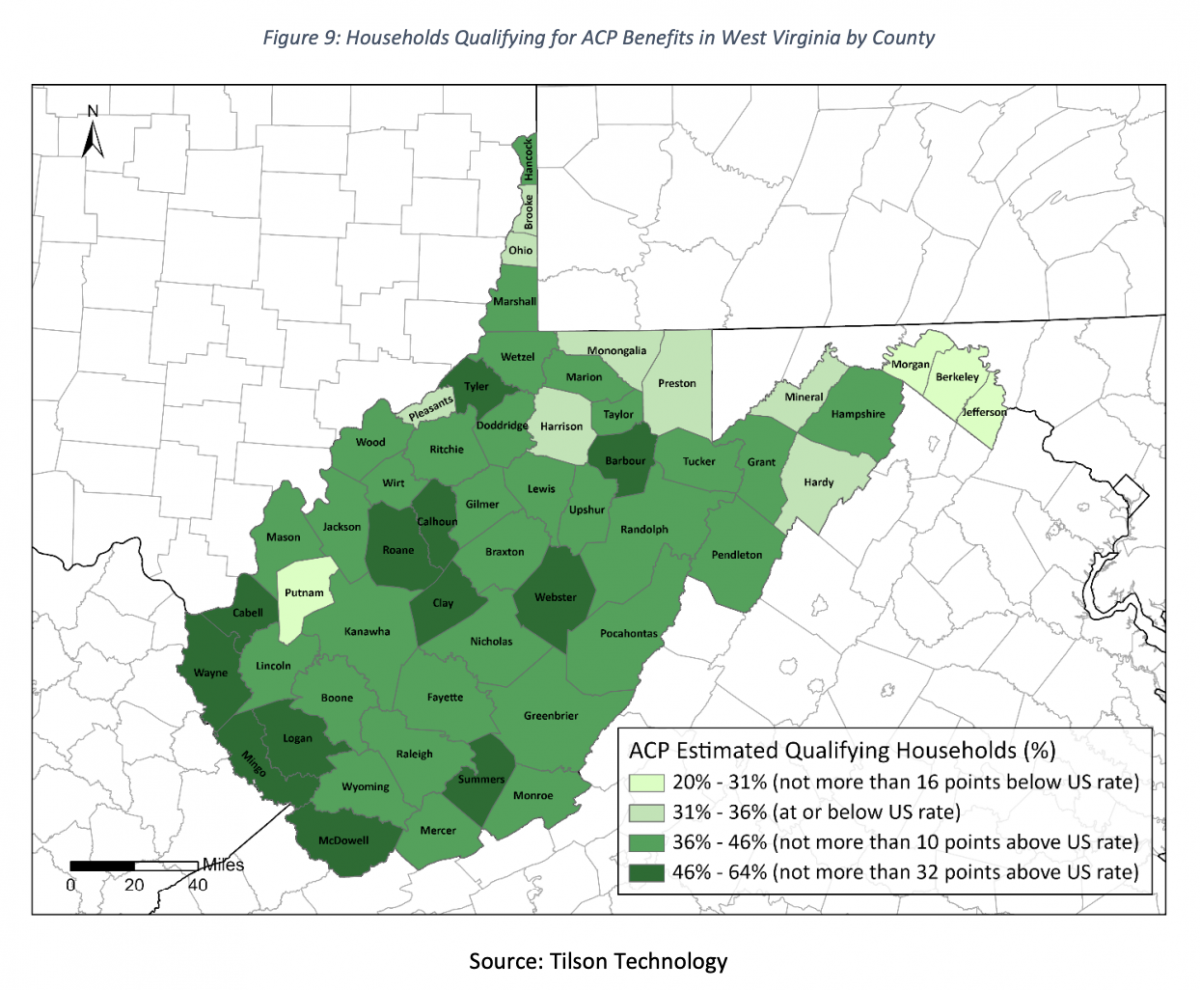West Virginia's Plan for Digital Equity Depends on the Affordable Connectivity Program
Tuesday, September 12, 2023
Digital Beat
West Virginia’s Plan for Digital Equity Depends on the Affordable Connectivity Program
States are banking on the ACP to ensure broadband is affordable for their low-income residents, but the future of the program remains uncertain. This week we are spotlighting the role ACP plays in states’ digital equity plans to achieve universal broadband.
Ninety-seven percent of West Virginians are considered part of covered populations, the highest percentage of any state in the United States. According to American Community Survey estimates, West Virginia ranks 47th out of 52 states and territories in percentage of the population with internet access.
In West Virginia the cost of high-speed broadband internet service remains a significant barrier to adoption. West Virginia’s affordability gap is particularly pronounced in rural areas, where high network deployment costs and limited competition have driven prices beyond affordability for the area’s lower-than-average income households.
Approximately 39 percent of West Virginian households qualify for the Federal Communications Commission’s Affordable Connectivity Program (ACP). This compares to 36 percent of qualified households nationwide. As of May 2023, over 103,000 West Virginia households were enrolled in ACP. The West Virginia Department of Economic Development (WVDED) is aiming to have 250,000 eligible households enrolled in ACP by 2028, contingent on continued program funding. The 2028 goal would mean 68 percent of the state’s eligible households (368,000) would be enrolled in ACP. It is an ambitious goal: seven percentage points above the national best practice, defined by EducationSuperHighway.

In the West Virginia Draft Digital Equity Plan, WVDED adopted three goals to guide its investments in broadband access and adoption. Its first goal? Realizing affordable connectivity.
ACP provides eligible households in West Virginia with up to $30 per month toward internet service and up to $100 to purchase a computer or laptop from participating providers.
West Virginia works to increase ACP enrollment by partnering with higher education institutions, conducting listening sessions, and identifying and reaching areas with the largest adoption gaps.
The Internet for All West Virginia website, which was launched in February 2023, was developed to disseminate information about West Virginia’s participation in federal broadband programs and provide a centralized location to engage with stakeholders and communities. It prominently features the ACP as a way for residents to save money on their internet service.
West Virginia has made progress in increasing ACP enrollment. In May 2023, the West Virginia Department of Commerce launched a statewide traditional and social media campaign to encourage eligible West Virginians to sign up for ACP. The campaign targeted retired veterans, Supplemental Nutrition Assistance Program (SNAP) recipients, Medicaid recipients, single-person households making under $29,000, two-person households making less than $38,000, four-person households making less than $50,000, and other relevant groups. Thirteen of the state’s 55 counties now meet or exceed national ACP uptake rates.
Pending continued funding for the Affordable Connectivity Program–which is expected to run out of funding in 2024, leaving over 100,000 West Virginians without internet access–West Virginia aims to use federal resources to increase state outreach opportunities. WVDED is also planning to create standardized procedures for internet service providers (ISPs) to use when individuals sign up for service, to ensure that those who qualify for ACP are aware of it. WVDED then plans to meet with the ISPs to ensure buy-in and to make sure that these procedures are carried out.
The state will also rely on West Virginia 211 to provide information about the ACP to all callers— and develop a process to automatically enroll participants in other income-based assistance programs into ACP.
West Virginia’s first digital equity goal is affordable connectivity. And the state recognized the Affordable Connectivity Program is an indispensable tool to bridge the digital divide.
In this series:
Louisiana is Depending on the ACP to Eliminate the Digital Divide
ACP Key to Montana's Digital Opportunity Plan
The Single Most Impactful Affordability Asset Currently Available to Utahns is the ACP
West Virginia's Vision for Digital Plan Depends on the Affordable Connectivity Program
The Benton Institute for Broadband & Society is a non-profit organization dedicated to ensuring that all people in the U.S. have access to competitive, High-Performance Broadband regardless of where they live or who they are. We believe communication policy - rooted in the values of access, equity, and diversity - has the power to deliver new opportunities and strengthen communities.
© Benton Institute for Broadband & Society 2023. Redistribution of this email publication - both internally and externally - is encouraged if it includes this copyright statement.
For subscribe/unsubscribe info, please email headlinesATbentonDOTorg






